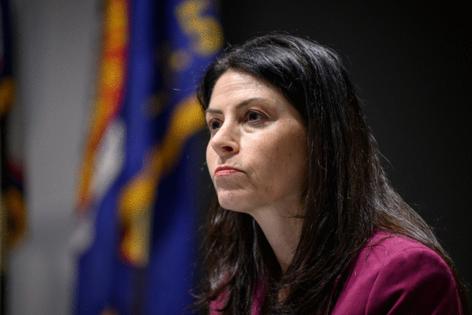Michigan AG Nessel labels Trump administration's order to keep coal plant open 'unprecedented'
Published in News & Features
MACKINAC ISLAND, Mich. — Attorney General Dana Nessel said Wednesday that her office has begun weighing whether to sue President Donald Trump's administration over its order that a coal-fired power plant in Michigan that was scheduled for closure remain open for 90 more days.
Trump's Department of Energy unveiled the decree on Friday, saying that there was an emergency "due to a shortage of electric energy" and that Consumers Energy's J.H. Campbell plant in West Olive should be available to operate until at least Aug. 21.
The looming fight over the order could test the Trump administration's push to reinvigorate the coal industry and Michigan Democratic leaders' focus on moving to renewable sources of energy.
In an interview at the Detroit Regional Chamber's Mackinac Policy Conference, Nessel, a Democrat and Michigan's top law enforcement official, labeled the federal order "unprecedented" and based on a "fabricated emergency."
"If we believe in capitalism, if we believe in the free market, then how can people be OK with having a federal government who gets to dictate all of the decisions that are made by companies around the United States?" Nessel asked.
Asked if her office would sue the Trump administration over the order, Nessel said it was possible and her staff was currently having those conversations.
"This is undermining a business decision that was made many years ago," Nessel said. "To me, this is unprecedented."
Katie Carey, a spokeswoman for Consumers Energy, confirmed on Wednesday that the utility had been planning to shutter the coal-fired plant since 2021 and believed it could provide the energy supply its customers needed without the plant.
However, Carey said Consumers planned to comply with the new order from the Trump administration.
"As part of our mission to become a cleaner, leaner and flexible energy company, we’re officially retiring our J.H. Campbell Complex beginning in early 2025," the Consumers Energy website said. "This will allow us to get closer to end coal use by 2025, lower our carbon footprint, and add more renewable energy for us to deliver."
In November 2023, Michigan Gov. Gretchen Whitmer, a Democrat, signed bills that imposed a 100 percent clean energy standard for utilities to hit by 2040 and shifted power to authorize large-scale wind and solar projects from local governments to the state's Public Service Commission.
It wasn't immediately clear Wednesday how much it would cost for Consumers to keep the Campbell plant available and where the money would come from.
Asked whether Consumers would continue to comply if the Trump administration continued the order to keep the plant open for more than 90 days, Carey didn't answer directly.
"We're going to have to take that when it comes," Carey said.
In April, Trump signed an executive order that said the country must "increase domestic energy production, including coal."
"Coal is abundant and cost effective, and can be used in any weather condition," Trump's order said. "Moreover, the industry has historically employed hundreds of thousands of Americans."
Then, on Friday, Chris Wright, the U.S. secretary of energy, signed the order to keep the Campbell plant available. The plant had been scheduled to cease operations on May 31, according to the order.
The plant opened in 1962 in western Michigan's Ottawa County, near Lake Michigan and can generate up to 1,450 megawatts of electricity to serve up to 1 million people, according to the Associated Press.
Wright's order said he had determined that "additional dispatch of the Campbell Plant" was necessary to best meet the emergency and serve the public interest.
"This determination is based on the insufficiency of dispatchable capacity and anticipated demand during the summer months, and the potential loss of power to homes and local businesses in the areas that may be affected by curtailments or outages, presenting a risk to public health and safety," the order said.
Nessel said Consumers had developed and pursued a resource plan that included the closure of the plant.
"They have to operate an outdated coal plant that was in the process of being decommissioned, because the president is making them? How does that happen? How does that work?" Nessel asked.
Nessel added that there are companies that fear retribution by the president's administration.
"They're afraid to go to court because they think it will inspire even more detrimental actions," Nessel said.
However, Senate Minority Leader Aric Nesbitt, R-Porter Township, defended the order from the Trump administration and said he favored a larger review of whether coal-fired plants scheduled for closure across the U.S., including the one in Michigan, should stay open.
Nesbitt said Democrats had been pushing the closure of coal plants for 15 years, regardless of the economic impact.
"They have this view that they can run the economy out of rainbows and pixie dust, and you can't," Nesbitt said. "You've got to be energy abundant."
Likewise, state Rep. Luke Meerman, R-Coopersville, touted the Trump administration's order.
"Baseload energy production is essential to ensure the energy supply meets demand during peak hours," Meerman said. "Diversifying energy generation cannot come at the expense of reliability.
"We cannot afford to shutter energy plants like the J.H. Campbell, or we will start facing widespread outages due to early generation retirement."
_____
©2025 The Detroit News. Visit detroitnews.com. Distributed by Tribune Content Agency, LLC.







Comments